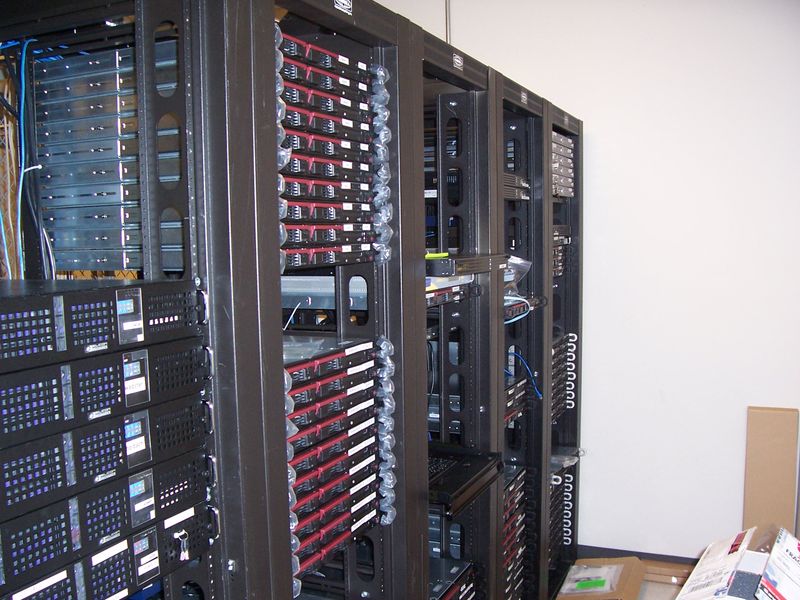Cooling The Web - Data Centres Adding to Climate Change
Interview with
Meera - Airlines often get a lot of criticism from the green movement for the amount of greenhouse gases they emit. According to a new report another industry could soon be overtaking them in this area. I've come down to London to meet up with our resident tech expert, Chris Vallance, to find out more. Chris, what industry is causing all the problems?
 Chris V - It comes from a surprising quarter. These are data centres. These are the vast collections of computers that power everything from online banking to, let's say, dancing hamsters if you watch those. They are these big computer warehouses that power the internet. They do produce a lot of greenhouse gases. A report by McKinsey and Co. suggests that by 2012-2015 they could overtake the airline industry in terms of the amount of greenhouse gases they produce.
Chris V - It comes from a surprising quarter. These are data centres. These are the vast collections of computers that power everything from online banking to, let's say, dancing hamsters if you watch those. They are these big computer warehouses that power the internet. They do produce a lot of greenhouse gases. A report by McKinsey and Co. suggests that by 2012-2015 they could overtake the airline industry in terms of the amount of greenhouse gases they produce.
Meera - How do they produce so many emissions?
Chris V - The reason is they consume an awful lot of electricity. They consume an incredible amount of power. To find out where that energy goes and how they use it I went to visit one data centre. I can't say where it is, I can't say who it is and I can't say who I spoke to other than to say he was the person sort of in charge. His name was John and he took me on a tour of the data centre.
Chris V - The room is filled with large cabinets about the size of one of those fridges you might have at home. Each one is a rack of processing power, that computer processing generates a lot of heat. Standing in front of this I can feel the heat coming off the back. That heat has to be taken away and if we come round the front the floor is a little bit Marilyn Monroe. It's filled with air conditioning. There's cold air rushing up from beneath us to take that heat away. These computers obviously generate a lot of heat.
John - Typically in this industry: six seven years ago you'd look at your typical cabinet would produce 300W, maybe 400W of power. 3 or 4 light bulbs' worth. You look at your modern blade servers: you can fit maybe four chassis into a computer cabinet each taking 4kW so you're looking at 16kW of power. That's 8 two-bar heaters for each cabinet.
Chris V - This room is filled with those cabinets so that's a lot of heat. You can imagine this room being filled with two-bar heaters.
John - Absolutely, Chris. Heat rejection is becoming a bigger and bigger industry.
Chris V - We're on the roof of the building and in front of me, pretty much the entire roof space has been given over to air conditioning fans. John, I guess these are taking the heat away from those processors.
John - That's correct Chris. We're looking at, probably 2.5 maybe 3MW of heat being rejected from this roof at the moment.
Chris V - To give a sense of how much energy that is, that would be enough electrical energy to power 1000 homes?
John - Pretty much exactly right, yes.
Chris V - 3MW of heat. And this is just going into space at the moment?
John - That's correct. It's just going into space.
Meera - That was an insight into the world of data centres. It sounds like it's the amount of power they consume that's causing the problem.
Chris V - It's the power needed to run those vast collections of computers and then the power needed to cool them. I was told that, for every watt into a data centre computer it takes about 0.6-0.7 of a watt to actually cool that computer.
Meera - Is anything in progress to improve the situation?
 Chris V - Well, there are lots of efforts to try and make data centres more efficient. One of the ideas being proposed is that you could use the heat from data centres to do things like heat homes or heat swimming pools. The problem with that is data centres seem to get rid of the most heat on hot days which is when people least want heated swimming pools or heated homes. Perhaps there's only a limited use you can do with that. The main focus is on making the data centres more efficient so they actually consume less power.
Chris V - Well, there are lots of efforts to try and make data centres more efficient. One of the ideas being proposed is that you could use the heat from data centres to do things like heat homes or heat swimming pools. The problem with that is data centres seem to get rid of the most heat on hot days which is when people least want heated swimming pools or heated homes. Perhaps there's only a limited use you can do with that. The main focus is on making the data centres more efficient so they actually consume less power.
Meera - If they're causing the problems should we just stop going online to buy things then?
Chris V - Far from it. Obviously when we do online shopping or online banking the one thing we're not doing is driving our car to the shops or the bank so this activity of data centres, in a way, helps us save emissions. Perhaps they could cause less emissions than they do now. That's the challenge.
And to put some numbers on that claim, the report mentioned by Chris actually found that data centres emit about 0.3% of the world's total carbon dioxide, which is 170 million tonnes every year. And to put that into perspective; that's more than some entire countries release: Argentina and the Netherlands for instance both contribute less CO2 in total than data centres do!










Comments
Add a comment